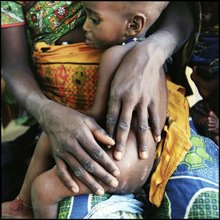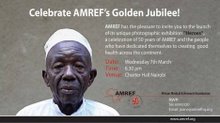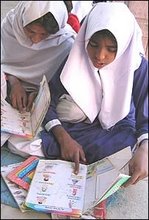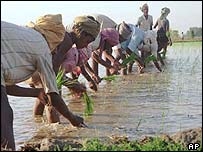PREAMBLE: We take the opportunity of the World Cup concluding today, to issue our blog a few days earlier than usual. This is a timely moment to take note of initiatives to bond international sport to the cause of world peace.
Congratulations are due to South Africa for its success in hosting this year’s event with evident warmth, safety and competence; this nation, more than most, symbolizes the universal striving for world peace, in its peaceful overthrowing of apartheid, and efforts to seek truth and reconciliation in its internal affairs. A standard is set for others to follow - we can all learn from South Africa.
We congratulate Spain as winners, and all other countries who competed, even those not selected to play in south Africa. We are sufficiently old-fashioned to think that participation lies at the heart of all sport; after all, without participants, there will be no ultimate "winner". With participation, at a more fundamental level, everyone is a "winner".
Our selection of this topic is not a new idea, but reflects a growing reality over many years that sports can be a force for international relations. Historically, this force has been used in various ways, from negative to positive. However, taking the high road, we note the following development in 2006:
In July 2006, the European Commission and the Fédération Internationale de Football Associations (FIFA) signed a Memorandum of Understanding (MOU) to promote football as a factor for development in Africa, in the Caribbean and in Pacific countries. According to the Commission, around 50 million people across Africa play football regularly and for many of these people, football is "an act of survival" and a means of rebuilding confidence and promoting tolerance and solidarity. It believes that linking football with development programmes can help make a difference to the lives of millions of people.
The Commission-FIFA MoU covers areas ranging from development cooperation and humanitarian aid to racism, post-conflict reconstruction, nation-building, health and education.
This background is extracted from the webpage cited below for the article which we showcase as this months blog topic.
SPORT FOR DEVELOPMENT PLAN ADOPTED
Ahead of the football World Cup in South Africa,... the United Nations (UN) together with the International Olympic Committee (IOC)... adopted a series of recommendations on harnessing the power of sport as a tool for development. The 19 recommendations cover humanitarian assistance, peace-building, education, gender equality, the environment and the fight against HIV/AIDS. They were adopted on 21-22 May during the first joint UN-IOC forum, entitled 'The Importance of Partnership', in Lausanne. The participants, including NGOs and academic experts, stressed the need to embed sport in national development policies to leverage its instrumental potential in the field. The forum also underlined the need to avoid creating parallel structures between the various different players and duplicating activities.
2010 FIFA World Cup
In the forum, the UN stressed that this year's football World Cup, which kicks off in South Africa on Friday (11 June), presents the country and the rest of the continent with a unique opportunity to build peace and development. "The World Cup in South Africa is a unique occasion to transform the African people's pride and enthusiasm into a positive dynamic of solidarity, tolerance and development," said Wilfried Lemke, special adviser to the UN secretary-general on sport for development and peace. A number of UN funds, programmes and specialized agencies are making use of the World Cup as a platform for outreach and collaboration to leverage the power of the event. Last October, the UN General Assembly adopted a resolution urging the international community to harness the World Cup for the development of the whole African continent.
Action plan on development through football
Earlier this spring, representatives of 63 development NGOs, football clubs, players' unions, sport organisations, academic institutions and governmental bodies gathered at an international conference on “Development through Football” in Vienna to adopt an action plan on football for development. The action plan calls for football governing bodies to support initiatives in the area of development through sport, especially at grass-roots level, and assign at least 0.7% of total revenue to social responsibility initiatives, for example. It further suggests the establishment of a strategy to raise media awareness of development through sport and using football as a tool for preventing violence, gender inequality, ethnic tensions and war.
Source: United Nations Office on Sport for Development and Peace (UNOSDP) http://www.euractiv.com/en/sports/sport-development-plan-adopted-ahead-world-cup-news-494939 07 June 2010
RECOMMENDATIONS
1. To recognise the honour accorded to the IOC through the
granting of UN Permanent Observer Status and the historic
milestone which this represents in giving an authoritative voice
to the sporting movement within the international community,
with the power to act as an advocate for the role of sport in the
service of peace and development.
2. To resolve to maximise the opportunity afforded by the granting of Observer Status to build on the IOC’s relationship with the UN and to sustain and complement the UN’s efforts to shape a peaceful future. Furthermore, mindful of the need for close cooperation with government authorities, to leverage this unique and seminal opportunity to interface with and influence national governments in the formulation of their development policies and to entrench sport within those policies by emphasizing its enormous power as an indispensable tool for peace and development.
3. To emphasise that it is incumbent on the Olympic Movement to
fulfil its collective responsibility and moral duty, in accordance
with the principles and values of Olympism, by identifying and
implementing best practice in the use of sport to promote
economic and social development; and further, to recognise the
need to think beyond the competitive character of sport to
maximise its contribution to development.
4. Mindful of the fact that the IOC will need to be proactive in its
relationship with the UN, to prioritise a dialogue with the UN on
the mainstreaming and embedding of sport within UN
programmes for humanitarian development and to seek the
UN’s active support and specific proposals with regard to this
undertaking.
5. To acknowledge and harness the power of partnership in sport
at all levels, from local, regional, international and sectoral, in
order to translate the vision of a peaceful, healthy society into
reality; and to recognise the need for a collaborative, sharing,
networking and learning approach which engages all key
stakeholders including the private sector, civil society and the
military. Furthermore, to facilitate all such partnerships by
building new alliances, defining new areas of co-operation,
creating fresh synergies and identifying the organisations and
institutions with whom the Olympic Movement can most
effectively collaborate to further our common goals, while at the
same time mindful of the need for a co-ordinated approach,
which complements ongoing initiatives and avoids the creation
of parallel structures and the unnecessary duplication and
overlap of activities.
6. To develop the IOC’s working relationships with the Other
Entities who have Permanent Observer Status at the UN in
order to realise our common goals, in particular the Red Cross
Movement, given their similar structures and shared objectives;
and to encourage the national affiliates of the International
Federation of the Red Cross and Red Crescent Societies and
the NOCs to work together, particularly in areas where they
have joint programming activities, such as in the field of
HIV/AIDs, disaster prevention and disaster response.
7. To underline the commitment of the Olympic Movement to
continue its efforts to combat HIV/AIDs, including the
dissemination of the ‘Tool Kit for the Sports Community:
Together for HIV and AIDS Prevention’, as widely as possible.
8. To recognise the contribution that the IOC has made in support
of the UN Millennium Development Goals to date and to stress,
on the occasion of this UN-IOC Forum, the Olympic Family’s
continuing commitment to engage with all of the MDGs and to
accelerate efforts to facilitate their delivery specifically through
the medium of sport and education by the 2015 target date,
including appropriate IOC participation in the UN Summit on
MDGs in September 2010.
9. To recognise the responsibility of the sporting movement to
strive for environmental protection and sustainability at all times:
and to commit the Olympic Family to the promotion of
environmental sustainability in all aspects of its work.
10. To acknowledge the unique contribution of the forthcoming
Youth Olympic Games in the promotion of Olympic values to
young people, including peace and development, and to
recognise the importance of outreach to young people in
tackling social challenges, by taking steps to connect with them
effectively, making full use of digital communications, the
internet and social media. Furthermore, in recognition of the
fact that the education system is the most comprehensive way
of reaching young people, to work with all relevant partners and
stakeholders, in particular national and local government
authorities, to ensure that the promotion of participation in sport
and physical activities is included in school curricula worldwide
in view of the contribution of sport to health, wellbeing and
education.
11. To commend the achievements of the International Olympic
Truce Foundation in its endeavour to encourage the study of
world peace and the creation of progress in its pursuits; and in
addition, the achievements of the World Taekwondo Federation
Sport Peace Corps in its successful outreach to young people
and its aims of building a better and more peaceful world; and
to advocate the consideration of its global expansion, in close
cooperation with key stakeholders, including the IOC, the UN,
national and international sports federations and NOCs, firmly
believing that together, we have the ability to promote global
peace and harmony through sport.
12. Mindful of the priority given to gender equity and the
empowerment of women in the UN Millennium Development
Goals, to affirm the importance of sport as a vehicle for the
achievement of gender equality and to continue to strive for
equal opportunities for women in and through sport, both at
grass roots levels and in leadership positions, while avoiding
generalised, one-size-fits-all approaches. Furthermore, to give
full recognition to the high-quality female role models in sport
and to increase the target number of women in leadership
positions and decision-making structures within the Olympic
Family and in the wider sporting world.
13. To ensure a fully inclusive approach, additionally by making
it a priority to include girls and women with disabilities in sport
for development and peace initiatives.
14. To resolve to promote more health-enhancing initiatives, in
particular to tailor and develop activities designed to reach
inactive groups and to forge new alliances with all stakeholders,
including public health authorities and the WHO for the purpose
of promoting healthy lifestyles and addressing the challenges of
obesity, poor nutrition and ill health.
15. To recognise that while sport alone cannot prevent the evils
of society and solve the world’s political socio-economic
problems, it can contribute to a climate of peace and to the
making of improved life for its citizens. That being the case, to
reflect on how to implement the UN Secretary-General’s
request for the IOC to consider organising more activities on the
ground in conflict or post-conflict situations and to identify
appropriate partners in this endeavour, both with UN agencies
and elsewhere, while remaining humble and realistic about the
contribution that the IOC and sport can make to peace-making,
peace-building and peace consolidation efforts.
16. To consider the creation of a web-based informationsharing
network for sport in peace and development, through
which information, expertise and know-how on local, national
and regional initiatives, case studies, research, best practice
and impact measurement and evaluation of projects can be
shared by all members of the Olympic Family.
17. To explore further the vast potential of ‘healing through
sport’, both in post-conflict situations and in equipping
communities to cope with the profound trauma caused by
natural disasters, recognising the need to customize sports
interventions according to the situation on the ground and the
need for collaborative efforts with established local community
development networks including coaches and volunteers, as
well as with UN agencies and NGOs, to build resilience and
create durable, sustainable change within devastated
communities.
18. To recognise the enormous contribution of volunteers to
efforts to advance peace and development through sport and to
encourage the IOC and the Olympic Family to participate in the
celebrations during 2011 to mark the 10th anniversary of the
International Year of Volunteers.
19. To recommend the holding of further UN-IOC Forums and
the continuation of the Working Party of the International Forum
on Sport for Peace and Development established by the
President of the IOC, whose remit would include the provision
of full assistance with all aspects of the preparation of the
second International Forum on Sport for Peace and
Development as well as a comprehensive review of the
outcome of the 2010 UN-IOC Forum.
Source: United Nations Office on Sport for Development and Peace (UNOSDP). UN-IOC FORUM: THE IMPORTANCE OF PARTNERSHIP Lausanne 21st-22nd May 2010. http://www.olympic.org/Documents/Development_through_Sport/Recommendations_UN-IOC%20Forum.pdf
FROM a Great Canadian and World Statesman
"A great gulf... has... opened between man's material advance and his social and moral progress, a gulf in which he may one day be lost if it is not closed or narrowed..."
Lester B Pearson
http://nobelprize.org/nobel_prizes/peace/laureates/1957/pearson-lecture.html
Sunday, 11 July 2010
Subscribe to:
Comments (Atom)
INSPIRATIONAL WELCOME ............................... from T.S.Eliot's "Little Gidding"
If you came this way From the place you would come from... It would be the same at the end of the journey...
If you came, not knowing what you came for, It would be the same... And what you thought you came for Is only a shell, a husk of meaning... From which the purpose breaks only when it is fulfilled If at all.


























